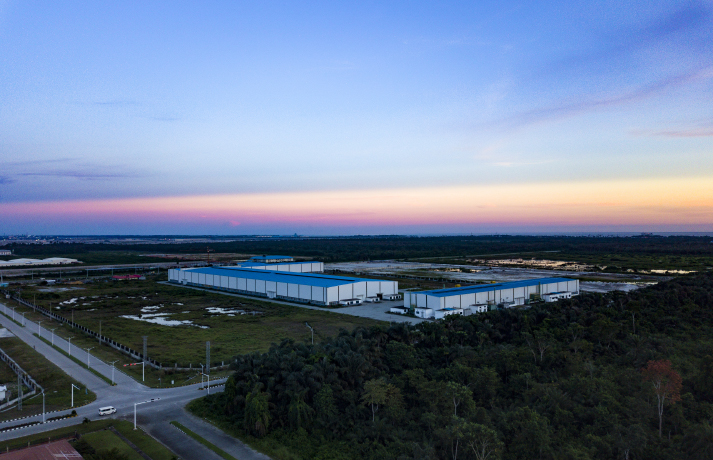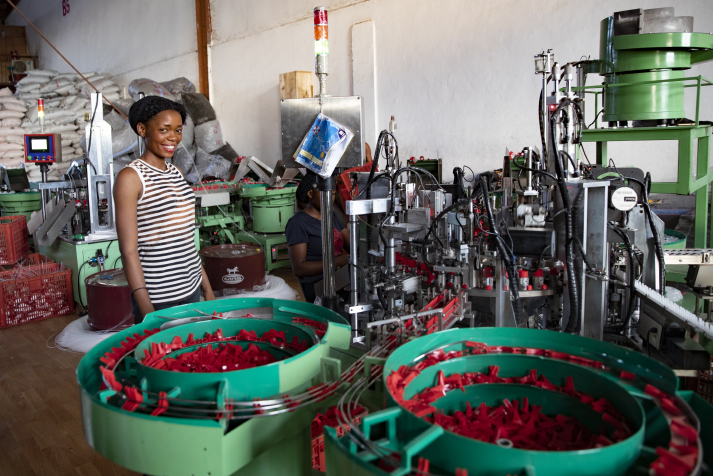| Business |
| In the Zone | |
| Nigeria's free trade zone hopes to cash in on China's success with special economic zones | |
|
|
 A bird's-eye view of the Lekki Free Trade Zone, which covers 30 square km in Nigeria (CHEN JIAN)
Zhang Yongjun exudes satisfaction with the decision he made eight months ago to move his company from China to Nigeria to expand his market. Before the relocation, Sunshine Houseware Co. produced plastic brooms and other plastic household goods in Ningbo, east China's Zhejiang Province, with the products mainly exported to Nigeria. This April, Zhang visited the Lekki Free Trade Zone (FTZ) in the Lekki Peninsula in Lagos, the most populous city in Africa, and after some research, decided to shift his company. "As my goods target Nigeria, manufacturing locally can reduce my production costs up to 20 percent because of the low labor costs and zero international transportation expenses," the 46-year-old told Beijing Review. The materials are also sourced locally. After relocating, Zhang expanded his production by increasing the number of his injection molding machines used to process plastic from two to six. It saw his annual output value rise to over 10 million yuan ($1.45 million). "What's more, producing in the FTZ can help me explore the surrounding markets in Africa," Zhang said. "I can also enjoy a lot of preferential policies here." Zhang's company is one of many Chinese enterprises operating in the Lekki FTZ. To date, 63 companies have signed investment agreements with the zone, of which 25 are operational or under construction, mainly in logistics, industrial manufacturing and auto assembly. All-round development The FTZ, which started construction in 2007, is an important part of the eight measures to strengthen China-Africa cooperation announced by the Chinese Government at the First Beijing Summit of the Forum on China-Africa Cooperation (FOCAC) in 2006. Today, it is at a fast-developing stage, construction and operation-wise, according to Lai Siqing, Deputy General Manager of China-Africa Lekki Investment Ltd., which controls 60 percent of the FTZ. The remaining 40 percent is held by the Lagos State Government. "It has a long construction process as we hope to use China's successful experience in developing its special economic zones (SEZs)," Lai said. "It is not simply an industrial development zone or hi-tech development area, but a zone with various functions and infrastructure like a city." The 30-square-km FTZ has different functional areas that include a manufacturing district, a logistics district, a business district and a real estate development district. It has its own electricity and water supply plants. "Since the power supply in Lagos is not stable, it is important to have our own power plant, which can ensure stable electricity supply for people's daily livelihood and production in the zone," Huang Xigong, Managing Director of Lekki Free Zone Development Co., said. According to him, the zone will house 120,000 people and provide nearly 60,000 jobs. "Our goal is to build the zone into a new satellite city that includes a new airport and a deep sea port," Huang said. China Harbor Engineering Co. began constructing the Lekki Deep Sea Port, a multipurpose port at the heart of the FTZ, in March. After completion, it will be one of the most modern ports in West Africa, offering enormous support to the development of the export-oriented FTZ. In addition, a new international airport has been planned 10 km from the zone. "The new airport and the deep sea port will increase the development potential of this area," Huang said.  A Nigerian employee works in a Chinese company's plant in the Lekki Free Trade Zone (CHEN JIAN)
Barren lot to modernity Like the SEZs China established soon after it adopted the policy of reform and opening up in late 1978 to attract foreign capital, advanced technologies and management expertise, the Lekki FTZ also has a series of measures to facilitate investment and attract technologies. "To establish a company like Zhang's Sunshine Houseware Co., you can go through all the government procedures and get a license without leaving the zone," Huang said. Government agencies such as customs, immigration, the Nigeria Export Processing Zones Authority (NEPZA) and police have set up offices in the zone to facilitate investment. In addition, there are hotels and hospitals. "We are a government department for licensing and monitoring operations of FTZs by providing a highly competitive incentive scheme, excellent support facilities and services for the purpose of creating an enabling environment for export manufacturing and other commercial activities," Nasiru A. Musa, an NEPZA official at the Lekki FTZ, said. "We also ensure that necessary incentives are given to the zones and enterprises." According to Musa, who has been working in the zone since 2007, the government encourages the development of FTZs. "The role of the zone is enormous in terms of promoting local development," Musa said, adding that he personally experienced the huge changes that have taken place in the past decade, from almost barren ground to modern facilities in the zone. To encourage investment in the FTZ, the Nigerian Government has preferential taxation policies. Enterprises in the zone are exempt from corporate tax, enterprise income tax, value-added tax and educational tax. In addition, the zone has a bonded function. Companies do not need to pay tariffs while importing product parts. They do so only after the assembled products are sold. Benefits for locals According to Huang, the development of the FTZ can not only diversify the country's economy by changing the heavy reliance on the oil industry, but also ease the unemployment burden. Nigeria's unemployment rate reached 16.5 percent of its total labor force in 2017, according to Opendataforafrica.org. "Our goal is to hire 60,000 local people in the zone," Huang said. The zone does not encourage companies engaging only in international trade, but welcomes manufacturers. "Trading companies hire fewer people than enterprises in the manufacturing industry," he said. "We hope to provide local people with more jobs." Currently, the companies in the zone are providing 2,500 jobs for local people. Its developer, Lekki Free Zone Development Co., employs 16 Chinese and more than 100 local people. Elvis Njoku, human resources officer of the company, has been working there since 2014, and is in charge of recruiting new staff and designing people-related policies for the zone. He said the zone provides stable employment. "Thanks to the zone, many people in nearby communities like me have the opportunity to work here and gain experience," he said. "When they work here, they can learn from the Chinese and Nigerian employees. This is the biggest advantage of working here." Njoku visited the China (Tianjin) Pilot Free Trade Zone in 2014. "I have learned a lot from the zone and I can see the zone is playing a very important role in promoting economic development of the municipality," he said. "I think our zone will be as good as the Tianjin zone. Through China-Nigeria cooperation, I am sure we can achieve that." "In China, SEZs and FTZs are playing important roles in economic development and have proven to be successful. In Nigeria, this FTZ is just in the primary stage. It will surely help promote local industrialization in the future," Huang said. (Reporting from Nigeria) Copyedited by Sudeshna Sarkar Comments to dengyaqing@bjreview.com |
|
||||||||||||||||||||||||||||||
|